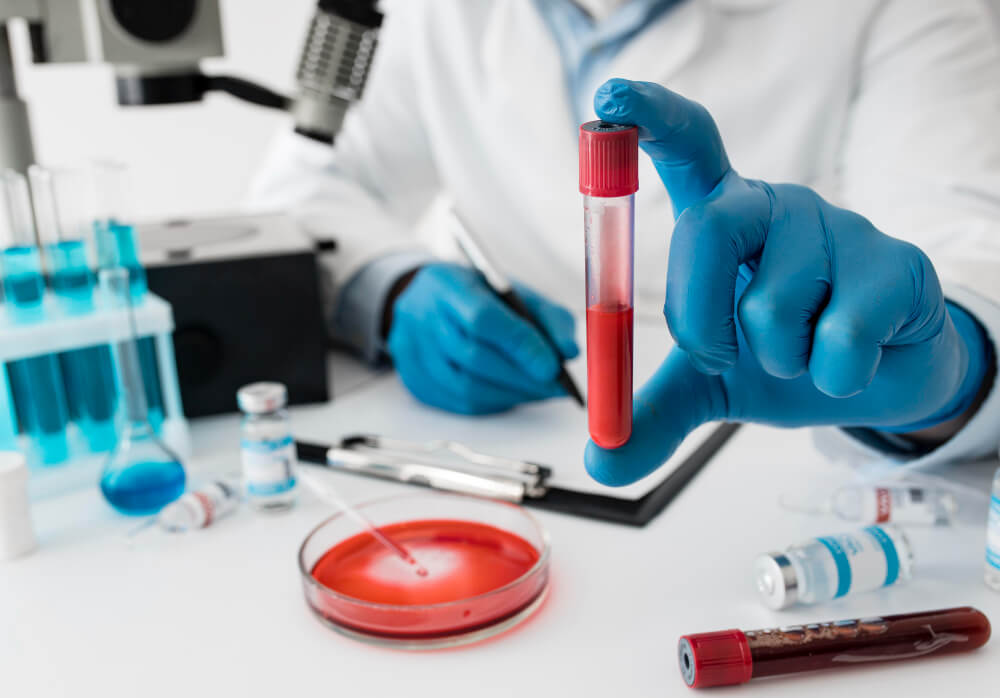Blood Tests and ELISA: Unveiling Your Health Story and Exploring Treatment Options
Blood tests are a cornerstone of modern medicine. These simple procedures provide a wealth of information about your health, allowing doctors to diagnose a wide range of conditions. However, sometimes the results can be cryptic, leaving you wondering what they mean and what treatment options are available. This is where ELISA (enzyme-linked immunosorbent assay) comes in. ELISA is a powerful diagnostic tool that helps interpret your blood test results, leading to a clearer understanding of your health and potential treatment options.

Understanding Blood Tests
Blood is a complex liquid that carries oxygen, nutrients, hormones, and waste products throughout your body. A blood test involves drawing a small amount of blood, typically from your arm, and analyzing it for various substances. There are many different types of blood tests, each designed to measure specific components of your blood. Here are some common types:
- Complete Blood Count (CBC): This basic test measures the number and types of red and white blood cells, as well as platelets, which help with blood clotting.
- Metabolic Panel: This test assesses how well your body is processing nutrients and checks for potential problems with your organs, such as the kidneys and liver.
- Lipid Panel: This test measures cholesterol levels (LDL, HDL, and total) and triglycerides in your blood, helping to assess your risk for heart disease.
- Thyroid Function Tests: These tests evaluate the function of your thyroid gland, which produces hormones that regulate metabolism and other bodily functions.
- Antibody and Antigen Tests: These tests look for the presence of antibodies (produced by your immune system to fight infection) or antigens (foreign substances that trigger an immune response) in your blood.
These are just a few examples, and the specific blood tests ordered by your doctor will depend on your symptoms and medical history.
ELISA: Decoding the Message Within Your Blood
ELISA is a highly sensitive technique used to detect specific antibodies or antigens in your blood. It works by attaching a label (usually an enzyme) to either the antibody or antigen of interest. This allows scientists to identify and measure the amount of the target molecule present in your blood sample. ELISA is particularly valuable for diagnosing infections, autoimmune diseases, and allergies.
Here’s a breakdown of how ELISA works:
- Sample Preparation: Your blood is drawn and processed to separate the serum or plasma, which contains the antibodies and antigens.
- Coating the Plate: Wells on a microplate are coated with either the antigen (if looking for antibodies) or the antibody (if looking for antigens).
- Adding the Sample: Your blood serum/plasma is added to the wells, allowing any specific antibodies or antigens to bind to the coated molecules.
- Washing Step: Unbound molecules are washed away.
- Detection Step: An enzyme-linked antibody (if detecting antigen) or antigen-linked enzyme (if detecting antibody) is added. This binds to the antibody or antigen already attached in the well.
- Substrate Addition: A substrate, a molecule the enzyme can break down, is added to the well.
- Color Change: The enzyme breaks down the substrate, causing a color change in the solution. The intensity of the color change is directly proportional to the amount of antibody or antigen present in your sample.
By analyzing the color change, doctors can determine the presence and quantity of specific antibodies or antigens in your blood. This information helps them diagnose a variety of conditions.
ELISA Applications and Examples
ELISA plays a crucial role in diagnosing various health conditions, including:
- Infectious Diseases: ELISA can detect antibodies against viruses, bacteria, and parasites, revealing past or ongoing infections. Examples include HIV testing and tests for Lyme disease, hepatitis, and mononucleosis.
- Autoimmune Diseases: In autoimmune diseases, your immune system attacks healthy tissues. ELISA can detect antibodies specific to these tissues, aiding in the diagnosis of conditions like rheumatoid arthritis, lupus, and celiac disease.
- Allergies: ELISA can detect antibodies produced in response to specific allergens like pollen, dust mites, or food proteins.
- Hormonal Disorders: ELISA can measure the levels of certain hormones in your blood, helping diagnose problems with the thyroid, pituitary gland, and other hormone-producing organs.
Blood Tests and ELISA Leading to Treatment Options
- Autoimmune Diseases: Treatment for autoimmune diseases often aims to manage symptoms and slow disease progression. Medications like corticosteroids, immunosuppressants, and biologic therapies can be used depending on the specific condition. ELISA can be used to monitor treatment effectiveness by tracking changes in antibody levels.
- Allergies: Once the specific allergen is identified, doctors can recommend avoiding triggers, prescribe medication to manage symptoms (antihistamines, corticosteroids), or recommend immunotherapy to desensitize the body to the allergen.
- Hormonal Disorders: Treatment for hormonal imbalances depends on the specific hormone involved. It can involve medication to replace deficient hormones, suppress overactive hormone production, or regulate hormone activity. ELISA can be used to monitor hormone levels and adjust treatment as needed.
Beyond Diagnosis: Additional Benefits of Blood Tests and ELISA

Blood tests and ELISA offer several benefits beyond diagnosing specific conditions:
- Monitoring Treatment: These tests can be used to monitor the effectiveness of ongoing treatment for various conditions. For example, monitoring changes in tumor markers after cancer treatment can help assess treatment response.
- Screening for Disease: Some blood tests, aided by ELISA, can be used to screen for diseases in individuals without symptoms. Examples include screening for cervical cancer or high cholesterol. Early detection of disease can significantly improve treatment outcomes.
- Assessing Risk Factors: Blood tests can identify risk factors for certain conditions, such as high blood pressure or elevated blood sugar levels. Early intervention through lifestyle changes or preventive medications can help prevent the development of these conditions.
Working with Your Doctor to Make Informed Decisions
If your doctor orders blood tests, don’t hesitate to ask questions:
- What are these tests looking for?
- What do the results mean?
- How might the results influence my treatment plan?
Understanding your blood test results can empower you to make informed decisions about your health. ELISA plays a crucial role in interpreting these results and guiding your doctor towards the most effective treatment options. Don’t be afraid to ask for clarification and discuss your concerns with your doctor.
Conclusion
Blood tests and ELISA are powerful tools that play a vital role in modern medicine. Together, they provide valuable insights into your health by analyzing the messages carried within your blood. This knowledge empowers doctors to diagnose a wide range of conditions and develop personalized treatment plans. As you work with your healthcare provider, understanding the role of blood tests and ELISA can help you feel more informed and involved in your healthcare journey.
